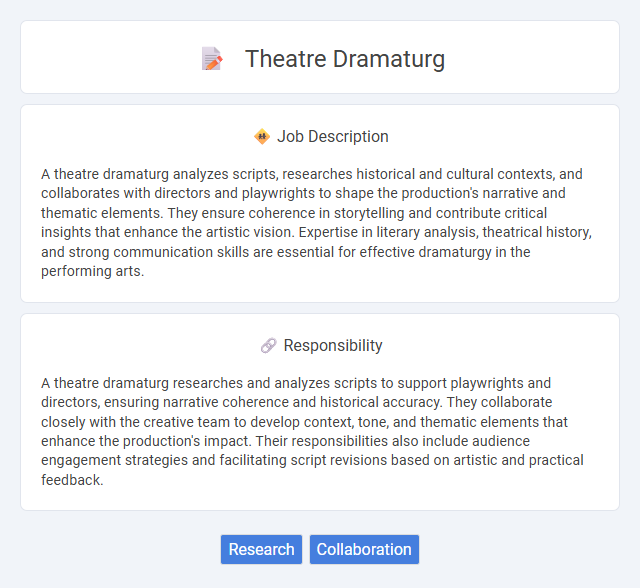
A theatre dramaturg analyzes scripts, researches historical and cultural contexts, and collaborates with directors and playwrights to shape the production's narrative and thematic elements. They ensure coherence in storytelling and contribute critical insights that enhance the artistic vision. Expertise in literary analysis, theatrical history, and strong communication skills are essential for effective dramaturgy in the performing arts.
Individuals with strong analytical skills and a passion for storytelling are likely to thrive as theatre dramaturgs, as the role involves research, script analysis, and collaboration with directors and playwrights. Those who enjoy working in dynamic, creative environments and can handle intellectual challenges may find this profession particularly suitable. People who prefer routine tasks or minimal interaction might face difficulties adapting to the demands of dramaturgy.
Qualification
A theatre dramaturg typically requires a strong academic background in literature, theatre studies, or dramatic arts, often holding a master's degree or higher. Expertise in script analysis, historical context, and dramatic theory is essential for shaping and interpreting plays effectively. Proficiency in research methodologies, collaboration with directors and playwrights, and excellent communication skills are critical qualifications for success in this role.
Responsibility
A theatre dramaturg researches and analyzes scripts to support playwrights and directors, ensuring narrative coherence and historical accuracy. They collaborate closely with the creative team to develop context, tone, and thematic elements that enhance the production's impact. Their responsibilities also include audience engagement strategies and facilitating script revisions based on artistic and practical feedback.
Benefit
Working as a theatre dramaturg likely enhances a production's depth by providing critical context and analysis that informs directorial choices and script development. The role probably increases the overall coherence and artistic quality of a performance through detailed research and collaboration with playwrights and directors. Engaging in dramaturgy may also offer professionals valuable opportunities to influence theatrical storytelling and innovate within the dramatic arts.
Challenge
The role of a theatre dramaturg likely involves navigating the challenge of interpreting and adapting complex scripts to resonate with diverse audiences. This position probably demands balancing artistic vision with practical production constraints, requiring sharp analytical skills and creative problem-solving. The dramaturg may frequently encounter the difficulty of collaborating closely with directors, playwrights, and actors to maintain the integrity of the narrative while enhancing its theatrical impact.
Career Advancement
Theatre dramaturgs enhance productions by researching scripts, historical contexts, and audience engagement strategies, making their expertise vital for directing and playwriting teams. Advancement opportunities often lead to senior dramaturg positions, artistic directors, or university faculty roles specializing in drama and literature. Career growth depends on building strong networks within theatre companies and publishing critical analyses to establish authority in the field.
Key Terms
Research
Theatre dramaturgs specialize in in-depth research to support the development and production of plays, analyzing scripts, historical contexts, and cultural references. They collaborate with playwrights and directors to ensure the accuracy and relevance of the narrative, enhancing thematic depth and audience engagement. Their research often includes studying archives, literary sources, and contemporary issues to inform creative decisions and enrich theatrical storytelling.
Collaboration
Theatre dramaturgs collaborate closely with directors, playwrights, and actors to shape and refine a production's narrative and thematic elements. Their role involves research, script analysis, and providing context that enhances the creative team's understanding of the work. This collaborative process ensures coherence between the script, performance, and audience engagement, resulting in a more impactful theatrical experience.
 kuljobs.com
kuljobs.com